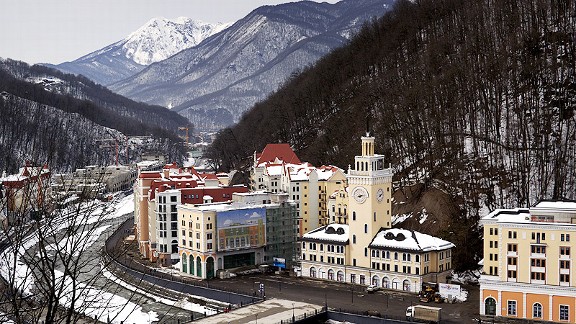
FSB Foils Attempted Assault on 2014 Winter Olympics
Publication: Eurasia Daily Monitor Volume: 9 Issue: 93
By:

With the world’s attention on London in the run-up to the 2012 Summer Olympic Games, it is important to bear in mind that the next Olympics in 2014 will be held in the Russian Black Sea resort town of Sochi, which abuts some of the tallest mountains in Europe. Terrorism is surely an important issue for both sporting events. The announcement on Thursday, May 10 that Russia’s Federal Security Bureau (FSB) had foiled a planned assault however, brings the issue of the Sochi Games’ security to the fore. According to RIA Novosti, Russian and Abkhaz security services seized a cache of arms and arrested three men accused of being part of the North Caucasus terrorist organization, Imarat Kavkaz (Caucasus Emirate -CE) (en.rian.ru, May 10). The weapons included light arms, mines, shells, ammunition, anti-tank and surface-to-air missiles, ten kilos of TNT, flamethrowers and a topographical map of Sochi (mk.ru, May 10). Such damning evidence serves to remind international observers that the Games are likely to be the target of prospective terrorist attacks.
The discovery of a cache of arms in Abkhazia – especially a cache of arms filled with weapons not habitually used in terrorist assaults – however, should not be taken as definitive proof of a conspiracy. Many arms stockpiles were left over from the civil war that occurred there at the beginning of the 1990s that eventually led to Abkhazia’s de facto independence. Furthermore, the timing of the discoveries raises concerns, coming as it did just after Putin’s inauguration and return to the Presidency as well as his meeting with Abkhazian President Alexander Ankvab in Sochi (mk.ru, May 11). The similarity of the event’s timing to the thwarted “assassination plot” against Putin in Ukraine just before the Presidential election in March (New York Times, February 28) may also indicate that the arms discoveries have more to do with Russian internal politics than the external situation on the ground. Nevertheless, real threats, which could disrupt the Olympics in 2014, do exist in the region.
Perhaps the main such threat is that of radical Islam, which has been a problem in Russia’s North Caucasus since Vladimir Putin’s Second Chechen War from 1999-2002. Certain political analysts allege there are links between Al-Qaeda and the Caucasus Emirate and Doku Umarov, the leader of the CE, has declared the North Caucasus part of the global jihad (Center For Strategic and International Studies, September 1, 2011; The Heritage Foundation, May 20, 2011). Today, terrorist attacks by separatist militants have become an almost daily occurrence in the North Caucasus, especially in the territories of Chechnya, Dagestan and Ingushetia (dagestan.eng, May 8). Furthermore, Sochi is also located just nine miles away from the border with Abkhazia, a de facto independent region of Georgia since the 1990s when it effectively broke away in a war accompanied by ethnic cleansing. Renewed ethnic strife in the region thus also poses a threat to the Games.
A similarly significant threat comes from the fact that Abkhazia was a contested territory in the 2008 Russo-Georgian war and today is recognized as independent by a handful of countries, including Russia and Venezuela. The international situation between Russia and Georgia remains tense to this day. In Russia, the National Anti-Terror Committee (NAK) accused Tbilisi of cooperating with Umarov’s radical Islamists in orchestrating the supposed attacks on Sochi (Moscow Times, May 11). Russia has accused Georgia of colluding with radical Islamists before. The Georgian Interior Ministry released a statement describing the allegations as “utterly absurd” and the alleged links with Islamic militant groups completely baseless (civil.ge, May 10). Although the claims do seem like mud-slinging, this should underscore the fact that relations between Russia and Georgia remain highly tense and are likely to remain so through the Olympic Games as well.
Further, both Russian Neo-Nazis and Cossack paramilitary formations are active in the ethnically Russian regions of the North Caucasus, Krasnodar Krai and Stavropol. There were pogroms against indigenous peoples of the North Caucasus in Stavropol in 2007 and a recent racially-motivated murder in Rostov-on-Don (eng.kavkaz-uzel.ru, May 11). In April, after a brief scuffle with members of the Armenian diaspora, Russian and Cossack nationalists took to the streets in the “Russian jog” in Anapa, Krasnodar Krai (eng.kavkaz-uzel.ru, April 9). The entire area thus remains primed for aggressive action from xenophobic, racist and nationalist groupings. Should radical Islamists or ethnic separatists attempt attacks during the Olympic Games, one could anticipate retaliatory violence from racist elements.
These threats are not solely limited to the 2014 Olympics, but also to the even more popular soccer World Cup in 2018. The matches will take place in European Russia, with the candidate host cities being Moscow, St. Petersburg, Rostov, Krasnodar, Sochi, Volgograd, Ekaterinburg, Samara, Kazan, Nizhny Novgorod, Yaroslavl and Kaliningrad (2008 FIFA World Cup Index, fifa.com). Four of these candidate cities are located in the North Caucasus. With the World Cup final being the most televised sporting event on the globe, it would be highly surprising if terrorists did not see this as an opportunity to bring attention to their cause. Similarly, given the association of football with racism throughout Europe and the fact that many more spectators of non-European descent will be at the World Cup, Neo-Nazi gangs are likely to constitute a more sizeable threat in 2018 than in the 2014 Winter Olympics. Russia will have a lot to do to demonstrate the wisdom of holding both global sporting events in that country.




